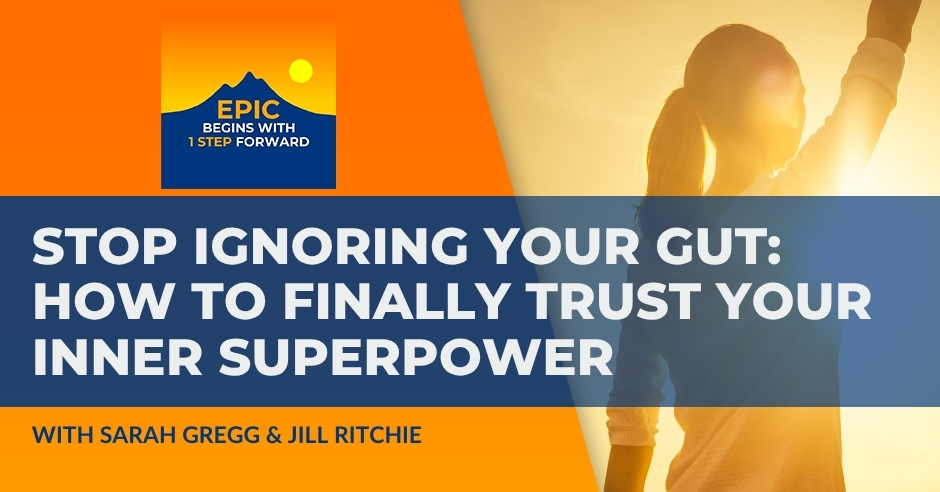Do you ever feel like you know something deep down… but you ignore it anyway? You’re not alone. In this episode of Epic Begins With One Step Forward, host Zander Sprague is joined by Sarah Gregg and Jill Ritchie, co-founders of The Intuitive Psychology Association, to explore why we’ve become so disconnected from our intuition—and how to reclaim it. You’ll learn why modern life keeps you stuck in your head, how multitasking blocks your inner wisdom, and why tuning in starts with something as simple as closing your eyes and taking a breath. From meditation and journaling to the science of “felt sense,” Jill and Sarah break it all down with humor and heart. Plus, they share their free Question Method tool to help you take that first step toward living more intuitively. Ready to reconnect with your inner knowing? Let’s begin.
Apply to be a Guest on My TV show
#EPICBeginswith1StepForward, #ZanderSprague, #Intuition, #Gut, #InnerWisdom
—
Watch the episode here
Listen to the podcast here
Stop Ignoring Your Gut: How To Finally Trust Your Inner Superpower With Sarah Gregg And Jill Ritchie
Welcome back to another exciting episode of Epic Begins With 1 Step Forward. I’m your host, Zander Sprague. I am joined not by one, but by two fabulous guests. I have Sarah Gregg and Jill Ritchie from Intuitive Psychology. Sarah, I’ll start off with you. Tell us who you are and what you do.
We are the very Pride co-founders of The Intuitive Psychology Association. We are the world’s first and only intuitive psychology coach training program. We blend modern psychology with ancient wisdom to get the most transformative results for coaches.
Jill, what can you tell us about yourself?
I’m Jill. I’m also the very Pride co-founder. I’m from Scotland and the UK, in case you hadn’t worked out from my accent. Sarah and I both live in the UK. What I can tell you about me is I’m highly intuitive. My passion is to bring as many people as we possibly can back to authenticity, back to their intuition. Your intuition is your superpower. It is a huge mission within our organization to do this for as many people as we possibly can.
Demystifying Intuitive Psychology: Merging Science And Ancient Wisdom
I’m not going to keep addressing. I’ll let both of you or whoever wants to answer. Can you break down what intuitive psychology is? I think I know what it means, but I would love for you to tell me what it means.
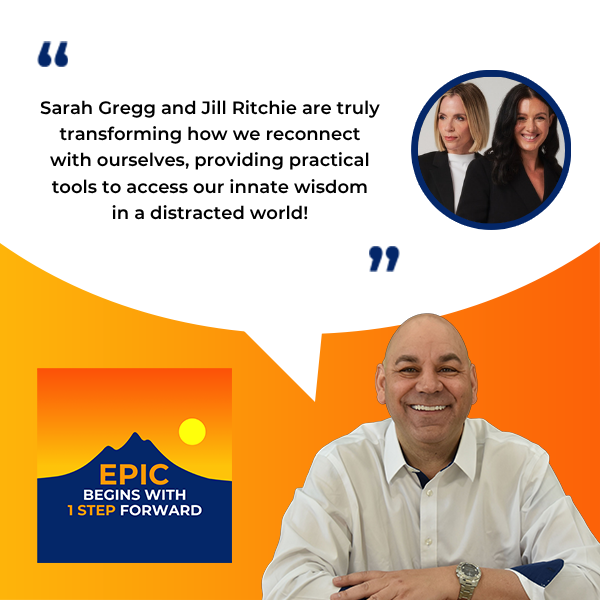
Intuitive psychology is our innate ability to know, trust, and heal, wed with the scientific methods of psychology understanding. It’s a blend of two worlds. It’s our intuitive world. A world that is grounded in ancient wisdom and a bit of mystery, but one that we certainly know exists. If you’re tuning in right now, it’s likely that you’ve had some form of intuition. You’ve had times when your intuition has spoken strongly to you. Maybe you’ve had a gut feeling about a certain someone or a situation that you’ve been in.
The easiest way to think about how powerful intuition is is to think about the times when you’ve gone against your gut. How well have those times worked out for you when you’ve ignored that strong signal and you’ve gone in the opposite direction? You weren’t sure, but you have this strong knowing without knowing. We know that intuition is the sixth sense. We know that every single person has their intuition. It doesn’t necessarily exist more strongly in males or females. It’s universal to each of us.
When we approach our world of mystery, it can feel unknowing. How do I know how to trust my intuition? How do I work with that? We wrap the evidence based around intuition to help people understand how to access their intuition. The way that we do this is it’s so much more than the simple intuitive nudge. That’s the easiest way to describe it.
The way that we work with intuition enables you to bring you back to a deep sense of intuitive trust. It’s a way to help you heal from your past, be fully grounded and immersed in the present, and aligned with that compelling future, so that the past makes sense. You’re able to engage in the present, and you’re able to take that aligned action towards your future and be in that state of harmony. It’s this Innovative framework that brings the world of science and spirituality together.
Disconnection & Distraction: Reclaiming Intuition In The Modern Age
That leads me to this question that popped into my head. I get it. You’re right. We have that intuitive feeling. In this day and age, we are perhaps the most disconnected from paying attention to our own feelings. It certainly makes sense, being a history major, if we go back to where we didn’t have computers, TV, internet, and all of that. We go back to let’s say the early 20th century, where your intuition probably played a lot bigger role in saving your bacon because it was perhaps more dangerous. You paid attention to your gut that this doesn’t feel right. Nowadays, I think lots of people are disconnected from their own feelings, if that makes sense, or their own intuition. Would you guys agree with that? How are you bringing people back to paying attention?
I wholeheartedly agree with that. It’s quite sad because our intuition isn’t passive. It’s there. It’s always ready to work with us, but we are so distracted by so much information, social media, and the media. We are being fired and wired with so many pieces of information that sometimes it’s almost taking us away from trusting ourselves. We can see how many people are struggling with their mental health, struggling with how they’re feeling, communicating their needs, boundaries, and living authentically.
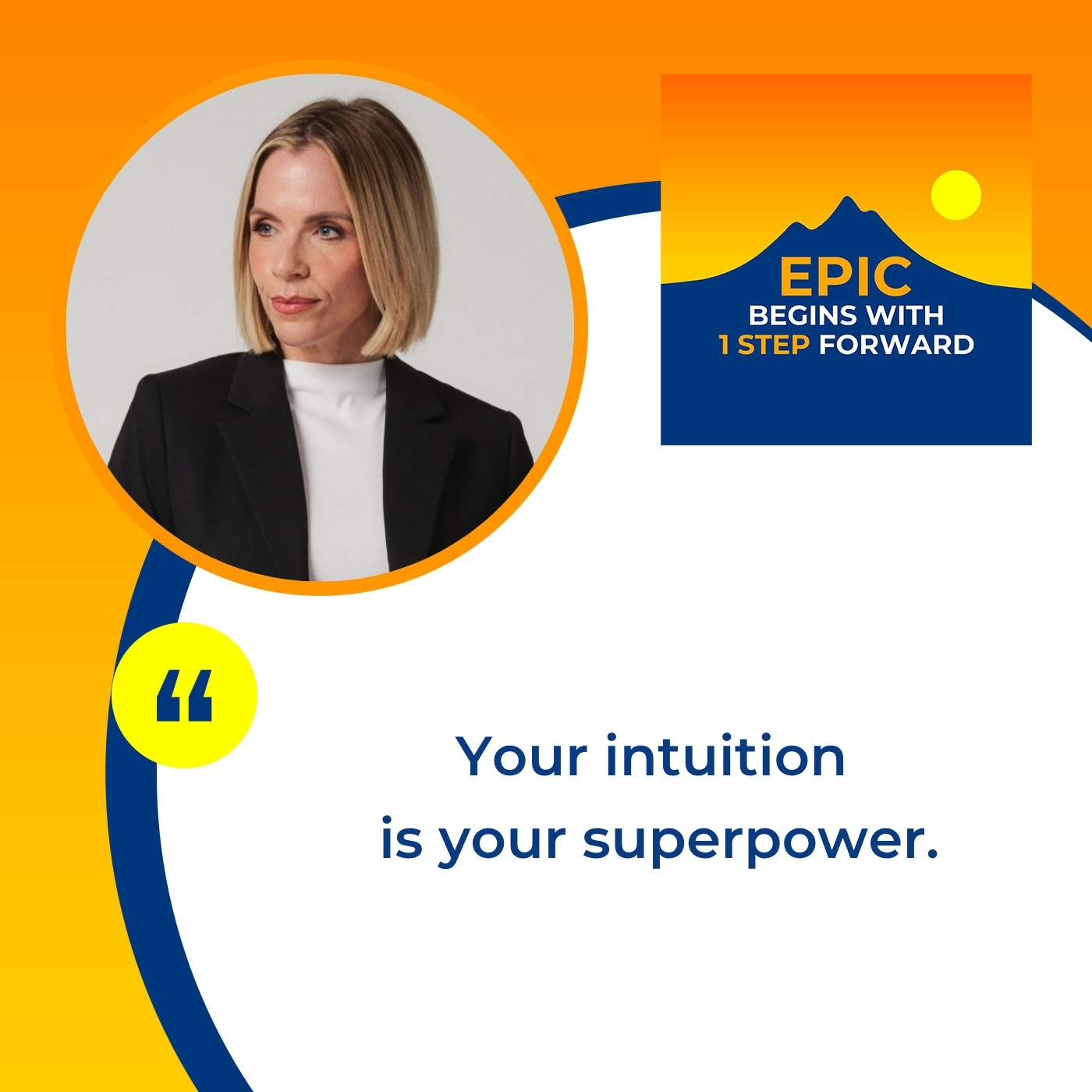
Even people who are perceived as being super successful. They may have all of the wealth, taking all the boxes in terms of achievements, but they feel so low and disconnected because they are disconnected from their own innate wisdom, their own intuition. Regardless of how many achievements they have, people have probably never felt more lost and separate than they do now.
What’s so beautiful about intuition is that it’s free. It’s not something that you need to pay for. It’s always available to us if we allow ourselves the space to get present. From my own experience, I was in corporate leadership for almost 21 years before I eventually got to that point of complete burnout. I was a mom to two very young children, and I couldn’t keep doing what I was doing. On paper, I was achieving all of the things and had a very good lifestyle and a lovely home, but I felt so unhappy. I felt so much shame on top of feeling that way because I was so disconnected and unfulfilled.
I can’t understand why I feel so unfulfilled. I’m doing all the things. I did what they told me to do, but I feel so unfulfilled, and I numbed out with so many things. When I looked around me, everyone was the same, so it was normalized. I was like, “This must be what life is like,” but I started to get sick. Here was when I didn’t sleep. I turned to meditation. By the way, I can sit for hours in meditation now, but I had never done this several years ago. I never sat in meditation, and that was challenging for me to sit because my mind was so busy with all of the pieces of information and all of the thoughts.
Full transparency, I was desperate to feel better, and I didn’t want to take medication. It was that intuitive nudge to try this. I did it on YouTube. I went on YouTube and I tried this 30-day beginner’s meditation. That’s what I’m seeing. We don’t need to always invest hundreds of thousands of pounds in different things. So much is available to us. That’s what I did. That was the catalyst for me to go down my path. I sat every day. At first, it was 30 seconds, then it was a minute, then it was two minutes, three minutes. Suddenly, everything started to get still. It’s so interesting because I’m looking at your background. You’ve got your book. It wasn’t about all of the things, like I needed to know every single step. I just needed to take the first step.
It’s amazing. I talk about it all the time. No matter how epic your journey, no matter how big whatever it is you’re trying to do, maybe it’s going back to school, running a marathon, or writing a book, when you take that first step, that 30-second meditation, you’ll discover that it’s not nearly as difficult as you would imagined it was. Ultimately, we can only do one step at a time. No matter how multitasking we all think we are. I joke because I spent 20 years in the corporate world on the technology side. I’m a single-core mind in a multi-core world, meaning lots of people and lots of things are going on. Truth be told, I cannot do math with my left hand and write an essay with my right hand. I cannot multitask very well. I can do a couple of things, but I’m not doing either one of those things very well.
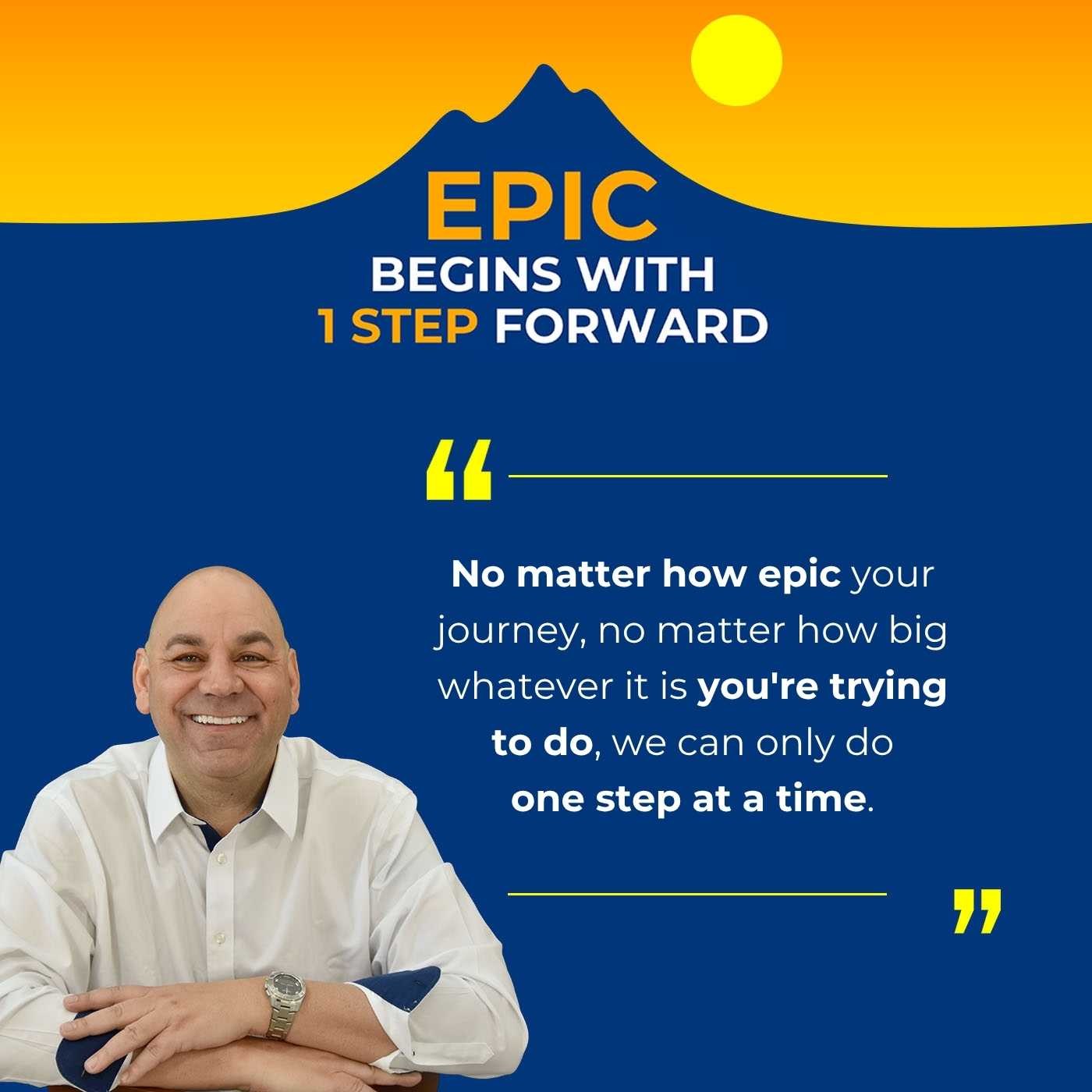
As women, especially, we can do all. I wear that badge of honor. Everyone else is like, “She’s crushing that.”
I can make lunch, be on a phone call, and change diapers.
Did you know the pure magic? I’ve returned from a few weeks in Bali. I went on a solo trip. I spent time on a retreat in a beautiful space there. I realized it before then, but the power in the presence and each moment, because all we have is this one moment where we are. Why do we want to multitask? In doing that, not only does that add pressure to yourself and exhaust you, but it also takes you out of the present moment. When you’re in that present moment, this portal opens up for so much more expansion in space and authenticity to move forward. That was such a recent moment for me where I was able to tap into just that one moment, that one step. Being in that fully and receiving that is the magic.
I’m also a mental health provider. When I’m doing counseling, I can’t tell you the number of times I’m talking to my clients, perhaps there’s anxiety or depression, those being the top two things that people seem to be dealing with. I believe so wholeheartedly that you’re right. We haven’t made it evolutionarily this far without our bodies adapting and being able to help us get there. I talked to them about paying attention to their somatic system.
Let’s say you have anxiety. By the time your brain goes, “Hold on, we’re feeling anxious,” there’s probably already been multiple signs from the rest of your body that you were starting to feel anxious. If you start to tap into that, amazingly, you can reduce or even cut off that anxiety attack because our brains are fabulous. We’re using 10% of it. What the other 90% are doing is keeping us alive, making sure that we don’t do anything too stupid.
Being a boy, we do lots of stupid things and we don’t think things through, but that’s not the point of the conversation. I’m saying I know that even though I’m a big boy here and I pay a little more attention, I still do stupid things. I don’t pay attention to the intuition that goes, “You might get hurt if you rode your bike off the roof of the shed,” but it still sounded cool, so my buddy and I did it. It’s only when one of us is sitting there with our ankle pointing the wrong way that someone goes, “Dude, we could get hurt.” Women don’t seem to do that nearly as often. I don’t know why.
Yes, we do.
Women probably do, with many other things as well.
I know. I’m poking fun at myself. You’re talking about intuition and stuff. Our somatic system, if you don’t know what that is, is basically all of your nerve endings and stuff. Your body is aware, your unconscious mind is aware way before your conscious mind that something isn’t feeling right, that gut feeling. By the time you recognize that gut feeling, it’s probably been going on for a little bit.
Exactly. I love that you brought up the unconscious and the conscious mind. Intuition is the delivery system between those two mechanisms. It’s a way to signal to us what’s happening because it’s the gut brain literally, like in the gut, in the somatic system, but also that unconscious that processes around 11 million bits of information, but only consciously about 126. That’s actually when we’re in a peak flow state, when we’re engaged.
That information doesn’t just get filtered out and go nowhere. That information is in the brain, and it’s in the body. Intuition is an incredible way to tune in to all of those things. It’s our inner bank of wisdom that we can access at any point. As Jill said, it’s free. It’s always available to us. It’s our sixth sense. We are sourcing so much of our own parts. Other people were continually searching for the answers, listening to incredible podcasts, looking at YouTube, investing in people, and reading books.
All of that is amazing, and it plays a part, but what if you could learn how to cultivate your own awareness? What if you could go in and understand all of those signals and cues that you’ve been talking about? How much can you imagine that your life would change when you become your own guru, or when you become your own guide?
Activating Your Inner Guru: Practical Steps To Access Intuition
I guess this is the question that not only I have, but I’m sure my audience does. How does one start to do that?
We know from psychology that intuition can be activated whenever we’re in a relaxed state. The easiest way is to close our eyes. At The Intuitive Psychology Association, we train and accredit coaches. Our secret weapon in coaching is eyes-closed coaching. We have a whole, evidence-based way to train our coaches. You can use and apply this easily in your everyday life. Close your eyes and regulate your breathing, which brings the body into a relaxed state.
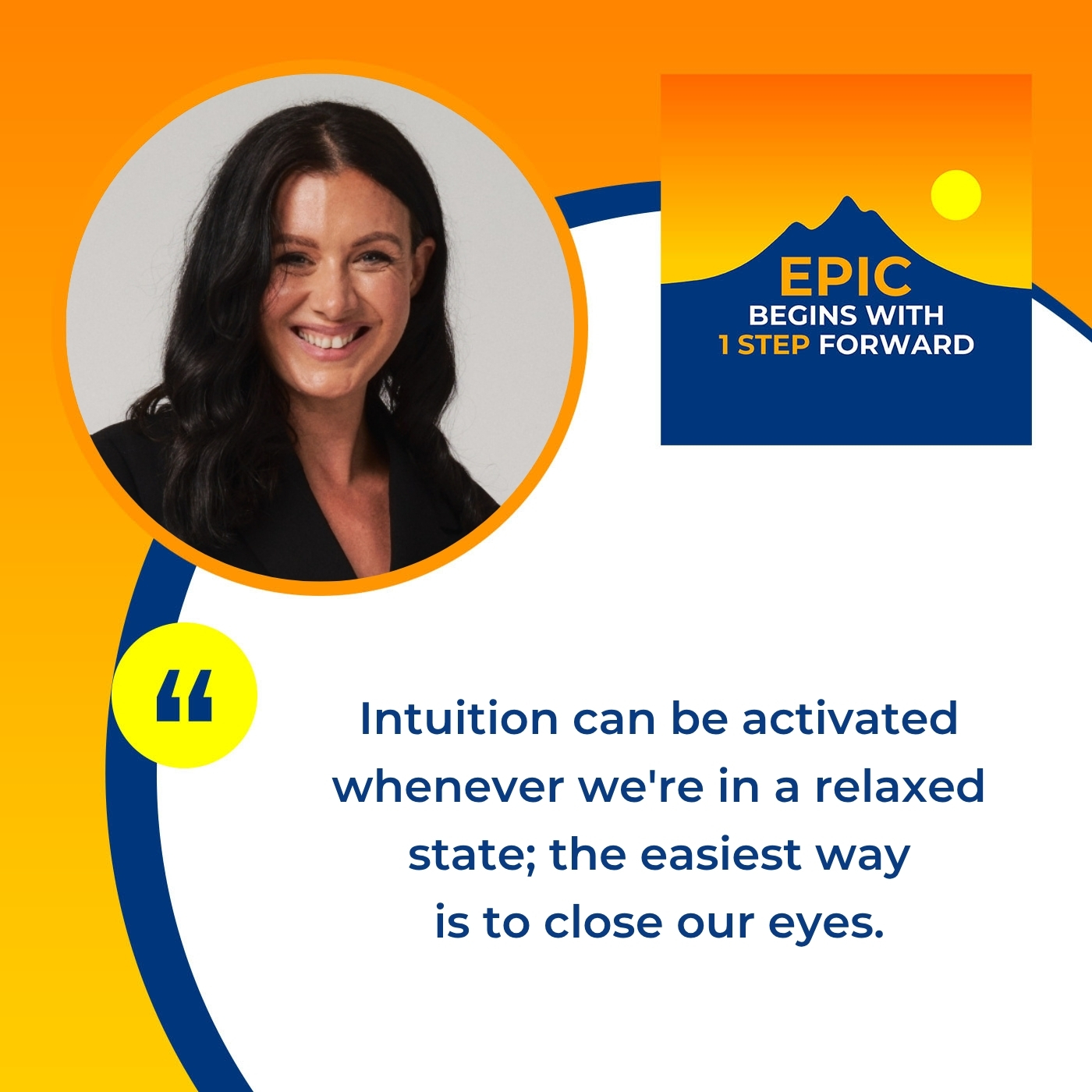
What this is going to do from a scientific point of view is it’s going to move your brain waves into an alpha state. We know that when we’re in an alpha state, that’s when intuition starts to become more active. We’re able to feel more. We’re connected to the body. From that state, you can ask yourself different questions. Maybe you’re at a juncture right now in your journey, and you don’t know what step forward to take. You hear all of this great stuff that you’re sharing. It begins with one step forward, but you’re like, “I don’t know if I want to move forward in that direction.”
One simple exercise to do is to close your eyes and regulate your breath. Your mind is going to be a little bit busy for a while, and that’s fine. Just let the thoughts pass. Once you feel relaxed and you feel connected, you can ask yourself a simple question. Think about the thing that you want to move forward with and take that one step you want to take, or you don’t know which path to take at the crossroads. Ask yourself, “What if I do and what if I don’t?” What if I do, imagine what that looks like if you take the step forward, and let your intuition speak, and it will speak to you normally. Short one single word, images, symbols, they all come flooding into consciousness, and that’s your evidence that you’re speaking with intuition.
If you get long narratives and the mind is quite busy, it means you need to take a few more breaths and spend a little bit longer in stillness, and that’s good. Equally, what does it look like if I don’t have the courage to take that one step forward? How does that feel in my body? What sensations are coming up for me? Are there any images? Just tune in and you’ll notice that high intuition begins to deliver those answers that you’ve been looking for.
It’s funny. You were talking about meditating for 30 seconds, and then two minutes, and now it sounds like you went to Bali and meditated for two weeks without stopping, which was great. I found when I had done meditation practice that you’re right, there’s so much external stuff. It does take a while. You’ve got to literally sit with it and pay attention to it. As you quiet the mind, all of a sudden, you have a moment to listen to all of those thoughts that are going through your head. You’re right, you have to go, “Okay, laundry,” and let it go, “Dinner.”
I know I found personally when I try to meditate, I’m concentrating on trying to quiet my mind, which I think is counterintuitive because I’m thinking about quieting my mind, which is not quieting my mind. It’s like when you’re doing yoga and they have you do savasana. You’re supposed to be letting go, and I’m like, “The only way I let go is if I fall asleep, because the brain is firing off.” I guess your brain is never quiet because, as you said, we’re taking 11 million inputs a second. Is our mind ever really quiet? I don’t know. I think it’s a different quiet. You understand where I’m going, where I’m like, if we’re taking on this info, and even if we’re being quiet, we’re still hearing a mosquito buzz or the hum of the light.
The trouble we have is we’re trying to control the mind, where the fight is with ourselves, and there’s no fight to be had. It’s almost the acceptance of the busyness of the mind. When we can accept that, a great question is what would happen if I were to accept the situation exactly as it is. This is where journaling is also good, writing down, because some people can drop into it easily. For others, sometimes journaling is doing a brain dump.
Give yourself 30 minutes to journal and play with it, so having the intention to play with this and have fun with it, but allowing yourself to brain dump, and almost always, what typically happens after a page or two, we drop into intuition. It can come through in that way too because we’ve allowed ourselves to empty the busyness of the mind, giving it permission almost to have a see, and then we drop into a different part of ourselves, which is it’s a felt sense as well. You feel that shift.
I think what happens typically is people get impatient. They try it once and they’re like, “I tried meditation and it didn’t work for me. I tried that thing. It didn’t work for me.” Of course, it doesn’t work if we’re telling ourselves it is not going to work. It’s something that we need to practice. That’s why it’s called meditation practice.
Exactly. It’s a practice. I was going to say it’s called a practice.
I think when your mind is busy, I often say to people when they say, “I’m not meditating because I’m not in this zen place where I’ve left my body,” if your mind is busy and you’re just observing or maybe sometimes you’re on the runaway train with the thought, and then you catch it and you come back again, that is meditation. You’re doing it right. That is it. It’s meant to feel like that at the start. There’s always a little wrestle in the rumble because we’re addicted to being busy. We get feel-good dopamine emotions whenever we’re checking the phone or jumping over to the next thing, and all our adrenaline is running through our systems, and the body loves that.
The minute you tell it to slow down, it’s similar to Jill. I remember when I was in corporate, they put on free mindfulness classes for it. I hated it. I hated it. I couldn’t even last ten minutes because no part of me wants to slow down. I loved my busy mind. I loved being fired up, tuned in, and all-go. To be honest, I was scared of what would happen if I slowed down. I was scared of the thoughts that would come up. I was petrified of what was underneath all of that.
It was so much easier to live in that zone of distraction. I get it if you’re tuning in to this and it’s like, “I have tried and it’s difficult.” It’s just that little nod. Maybe this is your little synchronicity and sign from the universe to stick with it a little bit. I know that all of us have gone through that journey of being uncomfortable with being with ourselves because we’re rarely alone with ourselves.
Journaling & Intuition: Beyond Writing, Finding Flow & Wisdom
What I would say to the audience is you already know what it is to have to do a meditation practice because we all learned how to write. When you first started to learn how to write, it was a huge struggle. How do I make an A? How do I make a B? We all stuck with it, and now we know how to write. I’m pretty sure that if we need to write something down and we need to journal, as Jill was talking about, you’re just writing because you know how to do it. You do that because you practice. You build the myelin super highway of how to write letters, how to write words, and stuff.
Jill, I had a question for you because you were talking about journaling. I’m a talker, not a typer. I hate writing with the passion. It is so hard. If someone is like me and needs to journal, can you do a stream of consciousness like recording a brain dump that way to find your way, or do you think you have to have that mind-hand-paper connection?
I think both have a place, but I would encourage anyone. If you wanted to do that and speak it, for sure. Something happens when you write. Sarah has written a book, Find Your Flow. She has a journal system for flow and published a book about it. She’ll probably be able to tell us more about the science behind why we journal. For me, it’s the felt sense. I remember I started journaling eight years ago. I sat down and I was like, “I don’t know what to write. This is annoying. I hate this,” but here’s the thing. I said this to someone, “What we are not changing, we are choosing.”
For me, I knew something needed to change. If sitting down to practice even for a few minutes, writing down a few things just so I got myself into the space where I sat down, even though it was uncomfortable, and I wrote rubbish for probably about three weeks. I’m going to be on this. It was like “Today was a sunny day.” It was like I was a six-year-old Jill. “It was the second day today, and this is what I had for my world.”
It’s basic. That’s why I say to anyone, “If I can do this, anyone can do this,” because that was my label of journaling. Guess what happened? I started to journal a bit more about my feelings, and about Sarah, and things, what I was fearful of, and maybe some things I was feeling. Now, my journal, I’ve got stacks. I got one right here. I’ve got about twenty of those bad boys over the years. Thank goodness, no one reads my journal in my house.
I tried to think, but it’s almost been like therapy for me because it allows me to fully express all parts of me, all the parts that are hidden, all the parts that I maybe felt some shame around from my past, but it allows me to empty that, and guess what happens when I do that. I feel lighter. I start to almost talk to myself now as a third person. It’s like consciousness. It’s the highest version of me that comes through for guidance and wisdom. It’s intuition. You can tap into it that way, too.
We’re being fired and wired with so many pieces of information that sometimes it almost takes us away from really trusting ourselves.
I would say to anyone, if you’re looking to create change, what you are not changing, you are choosing, and even in the discomfort, be the one that says, “I’m going to do it.” Don’t try it once or twice. Give yourself at least 30 days. If it doesn’t work, come back and tell us. I’ll be shocked because we’ve yet to meet someone who commits to this for 30 days and it doesn’t work. Right, Sarah?
Absolutely. It’s tuning into what feels right for you. You can talk, but it’s more powerful when you write because you go into a more relaxed state. Equally, you can do things like draw, even if it’s a symbol or an image. You can paint. Anything that works with that part of the mind works strongly.
I do get that, although I would rather talk than type. I will pick up the phone and call someone before I write an email.
We need more of that. We were talking about that. No one phones anyone now.
Here’s the thing that drives me up the wall, a little pet peeve here, which is I would much rather call you, Sarah, and have a two-minute conversation that is a synchronous conversation to solve a problem than send you an email, you ask a question, and go back and forth. You want to know what? I spent all day on something I could have solved in two minutes. It’s because I preferred to talk. It’s my own thing, but when I try and write, I want to get it done as fast as I can so I don’t put my whole thing. The best class I took in university, I had to give an hour and a half lecture, I was in heaven, and it was great. It’s probably why I’m a motivational speaker, a podcast host, and all of that.
Had I been able to do oral exams, I probably would have much higher grade because I knew the stuff. Friends of mine were like, “I don’t know why you don’t have higher grades because you know this material much better than I do.” They’re coming to me to study. They’re like, “I don’t get why you didn’t get the name.” I’m like, “Because between here and here, it doesn’t go.” I’m not arguing. I think journaling could be important because there is a difference between talking, making noise, and being quiet. Quiet is not an adjective that gets used with me often, sadly.
It’s quite interesting, I wondered if you were going to mention something about school, like the education system. Normally, people who struggle to journal have had some negative experience at school. It’s still tied together. It’s interesting because when you spoke, what I heard you say was, “When I speak, there is praise and recognition, and there’s a nod to your level of understanding, but what I wrote, I didn’t get that, and people said there were different grades.” There’s a link that gets tied between the journal and writing down versus speaking. My invitation for you would be like, how can you untangle that a little bit? How can you recognize that the journal isn’t homework? You don’t have to get it right, and give yourself permission to dive into it.
I’ll tell you a super quick story about perhaps how deep this goes. I wrote my first book. I sat on it for five years, even though it was an important book that I wanted to get out. I was telling people, “I’m coming out with a book,” but I was no more coming out with the book than I was going to the moon. All of that was because I had all kinds of feedback that I wasn’t a good writer. How is anyone going to like it? I got tired of hearing myself say that. I listened to my intuition, and I put the book out there. A funny thing happened.
My first book was about sibling loss and my experience of losing my sister and stuff. An important book. People started writing to me or talking to me, going, “I enjoyed your book.” For the first six months, you talk about impostor syndrome. I was like, “Really?” I would have believed more if they told me it was the paper it was printed on that they liked the book.
Again, I guess the psychology of having more evidence to support that it was worthy versus a little CBT of whatever evidence I have to support that it is not the paper that was written on. I don’t have any. It’s that whole thing. Very interesting. You’re right. I should probably journal, try and see if I can unpack some of the stuff, quiet the mind a little. I love the work that you both are doing. It’s so important, and yay for you.
Thank you. That means a lot.
Could you imagine if you didn’t listen to your intuition, though, when you didn’t write that book, if you hadn’t written your books?
I know. If you would ask me in university if I would ever author a book, never mind three, “Do you think you’ll write a book?” No never. I hate writing, and I do. I don’t like it. I want to talk. That’s why I do what I do, so I can just talk because I’m so much better at it than I am at writing. Yet, I’ve written books, and people seem to like them.
It’s funny, isn’t it? Whatever we want to call it, the universe, life, or the self, will find a way for us to challenge that thought or behavior that holds us back the most. It will always bring us in the direction that we don’t want to go. It’s no surprise in a lot of ways that the universe will go, “One book. Okay, you’ve done that. You still haven’t received it. Okay. Here’s an idea for another book. Okay, here’s the third one.”
Exactly. “Still haven’t learned the lesson. Let’s go back to do that again.”
Receiving Greatness: Healing & Opening Up To Intuitive Guidance
It’s all about receiving it, isn’t it? We have many values within our organization. You go back to all of the things that you can achieve, but what happens when you don’t receive it? When we armor off to protect ourselves, not only are we armoring up from the heart, which serves a purpose and many ways, but we also armor up from receiving, and helping ourselves to feel and receive. We’re cutting ourselves off from everything, so how do we learn to let that wall down and do life from an open space, allowing ourselves to feel what needs to be felt, maybe from our past, and that part that’s still not fully allowing us to receive?
When we protect ourselves, we not only arm ourselves in a way that serves many purposes, but we also arm ourselves from receiving and truly helping ourselves to feel and receive.
When you learn how to let that wall down, and feel and heal that, maybe that little wound will allow you to receive it. Imagine receiving greatness. You’ve written three books. It’s such an achievement, but to be able to go, “I love talking, but I have these three incredible books. By the way, it will bring so much joy to people and help so many people.” It’s so important to receive that. I speak for myself because I struggled to receive and feel that.
You mentioned your sister. My mom passed away two and a half years ago. That cracked me open to another level. I was doing so much work within myself, but there was a part of me that I couldn’t access, no matter how much I tried. I wanted to be able to receive it on a deeper level, but there was so much fear around it. It’s not safe.
Since my mom passed away, that part of me cracked open. I guess for the last two and a half years, I’ve been learning to do life very differently from a place with the wall down. It felt very frightening and very scary, and I went back to, “I’m not safe.” Every time we feel that, it’s taking that step forward to change that narrative and to bring in that evidence of actually, it’s safe, and I’ll tell you what. How I feel now, doing life in that space of presence and receiving, is very different from anything I’ve ever felt before.
I think that’s great, and thank you for sharing. Believe it or not, our time goes so quickly. Both Sarah and Jill, you’ve shared so much. How can people find you, get hold of the information, and discover themselves again?
You can connect with us on social media. The best way is on Instagram. It’s We.Are.IPA. Also, if you’ve tuned in to this and you’re thinking, “Maybe I’ll journal, maybe I’ll ask myself a few questions,” but you don’t know where to start, we have a great resource that we will share the link with you. It’s called the Question Method. It’s 22 of our best coaching questions that illicit you to get in touch with your intuition, regardless of what stage you’re at. That’s a great free resource for everyone because we want so many people to start accessing their intuition. You can go to the link. You can download it for free, and you can start working with those questions. Let us know. Send us a message and let us know the results that you get from that and the insights that you have, because we’ve had so much feedback from this of people having these wonderful a-ha moments.
I want to thank both of you so much for joining me. Honestly, truly an epic conversation.
Thank you so much.
I want to remind everyone that if you’re ready to begin your epic journey, go to EpicBegins.com. As always, remember that epic choices lead to the epic life that you want.
Important Links
- The Intuitive Psychology Association
- Sarah Gregg on LinkedIn
- Jill Ritchie on LinkedIn
- We.Are.IPA on Instagram
- Find Your Flow
About Sarah Gregg
 Jill & Sarah are the two Co-Founders of the world’s first and only Intuitive Psychology Association.
Jill & Sarah are the two Co-Founders of the world’s first and only Intuitive Psychology Association.
Sarah Gregg is a highly regarded psychologist, coach, and author of “Find Your Flow” and “Choose Happy,” with over 85,000 books sold internationally. Holding a BSc (Hons) in Social Psychology, a Pg Dip in Careers Guidance, and numerous coaching and leadership certifications, she is a member of the British Psychological Society.
Her pioneering work on the psychology of Flow has been cited in prominent journals and publications, including The British Journal of Mental Health Nursing, establishing her as a leading expert who translates complex theory into practical tools for life transformation. With a proven track record of empowering clients globally and a background in delivering corporate training for major organizations, Sarah brings a unique blend of scientific expertise and real-world experience.
About Jill Ritchie
 Jill Ritchie is a highly acclaimed Intuitive Healing Coach and the creator of the UK Top 3 podcast, “She Loves Herself.” An accredited expert featured in Happiful Magazine and Thrive Global, she’s certified in diverse coaching modalities and has led transformative wellness retreats.
Jill Ritchie is a highly acclaimed Intuitive Healing Coach and the creator of the UK Top 3 podcast, “She Loves Herself.” An accredited expert featured in Happiful Magazine and Thrive Global, she’s certified in diverse coaching modalities and has led transformative wellness retreats.
With a proven track record of empowering over 500 clients, including actors, celebrities and Olympic athletes, Jill’s authentic approach, rooted in her own life reinvention from corporate banker to Intuitive Coach, establishes her as a leading voice in mental health and wellness.

